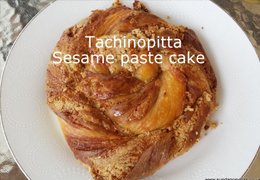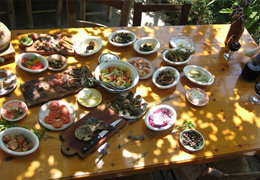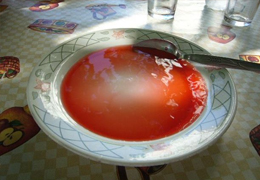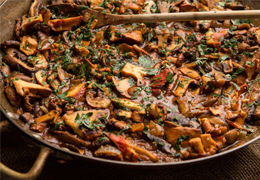Food and Wine
With emphasis on fresh local ingredients, a pungent mix of herbs and spices and a light spattering of olive oil, Cypriot food is essentially Mediterranean, similar to that of Greece and with a hint of the Middle East and Asia Minor.
Both poets and travellers past have praised the flavours of the island. In present times doctors and health specialists have added their voices in extolling the virtues of the Mediterranean diet. The grains and pulses, sun-ripened fresh fruit and vegetables, high-protein fish, lean meat and poultry, olive oil and wine are both a healthy option as well as an irresistible temptation.
In a society of extended families with close ties, it is not surprising that home cooking is an important feature of everyday life, with recipes passed down through the generations. Having a hearty meal in the company of friends and family is what it’s all about. No wonder that hospitality and conviviality are deeply ingrained in the Cypriot psyche, so much so that pleasing has become a fine art. So give free reign to your taste buds and indulge in a culinary feast.




Mezedes
For centuries, Cypriots have accompanied their drinks with meze – a large selection of delicacies consisting of many dishes with small helpings of delicious foods. Meze are a traditional feature of religious feast days, birthdays, weddings and name days. Feasting usually means endless eating, singing and joking, accompanied by wine and zivania, a strong spirit similar to vodka.
Served all over Cyprus, mezedes cover a broad range of some the best of local cuisine and can include up to 30 dishes. The feast begins with black and green olives, tahini, houmous, skordalia (potato and garlic dip), taramasalata (fish roe dip), and tsatziki, all served with a basket of fresh bread and a bowl of village salad. Some of the more unusual meze dishes that may be served include octopus in red wine, snails in tomato sauce, brains with pickled capers, kappari (capers) and moungra (pickled cauliflower). Bunches of greens, some raw, some dressed with lemon juice and salt, are a basic feature of the meze table. The meal continues with fish, grilled halloumi cheese, lountza (smoked pork fillet), keftedes (minced meatballs), sheftalia (pork rissoles)and loukanika (sausages).
It is then the turn of kebabs, lamb chops and chicken. The last dish to be served is fruit or the traditional preserved fruit glyko. Glyko is found in every home and is the first thing to be offered to a guest together with a glass of water.
Cypriot women continue to make glyko in the traditional way handed down from generation to generation and serve it with great pride.
Some of my favourite Cypriot foods are Kleftiko: slow cooked lamb shank, often served with potatoes. “Tashinobitta” a sweet sesame paste golden flat cake. Papantoniou sell a good version, and it is out of this world when still warm. Water melon with crumbled fetta cheese and finely chopped mint, lovely on a hot day. Souvla, chunks of BBQ lamb or goat cooked on the bone.
If you want to buy Trahanas (for soup) or Shoushouko, (candle shaped rose water sweet with almonds or walnuts in the centre) try to buy village made as the shop bought Shoushouko has very few nuts and artificial flavour although it looks the same. Home-made produce can be bought in villages like Statos-Agios Fotios near Agia Moni monastery, but you need to know who to ask as you will almost certainly be directed to a house or local shop. Trahanas is prepared in July and Shoushouko just after. They both freeze well. Please contact Nicole on mobile 99 599956 regarding this as she has contacts or ask Nick or George at Cy Breeze car hire.
Cyprus Coffee
Unlike most kinds of coffee served in Europe, Cyprus coffee is brewed in small, long handled pots, wide at the base and tapering at the top called “mbrikia” which were traditionally made of copper. The coffee is made from fresh, finely ground coffee beans, usually Brazilian.
One heaped teaspoon of coffee is added to each demitasse of cold water. The sugar is added while the water is still cold. The amount depends on whether you want your coffee sweet “glykis”, medium “metrios”, or unsweetened “sketos”.
The “mbrikia” are heated on the stove or in small trays filled with heated sand that transfers the heat in a more uniform and smooth manner. When the sugar has dissolved, the coffee is allowed to come to the boil, forming a creamy froth known as “kaimaki” on top. As the froth turns in from the sides, the coffee begins to rise and the pot is removed from the heat.
Cyprus coffee is served in small cups and is customarily accompanied with a glass of cold water.
The coffee is strong and it is sipped slowly. The thick layer at the bottom of the cup should not be drunk, though it does have a use for fortune-tellers who ‘interpret’ the dried patterns left behind. After finishing the coffee, the cup is turned upside down onto a small plate and left there for a few minutes to dry. It is then turned around again and the patterns left behind are claimed to reveal something about the person’s future. At least that’s what those who explain the patterns say.
Wine
Irene’s current favourite Cyprus red wines are Kolios winery Status 99 and Zambartas Lefkada. Also Kolios Cornetto Rose medium, full of flavour.
As you are staying in the Paphos region you have access to some good wines from the smaller local wineries, who are using up to date modern equipment and methods. You can taste the wines and buy direct at good prices.
We recently went to Crossroad Cava in Paphos for some wine tasting and filmed a little vlog, click here to watch it.
Lunch and wine tasting: 2 excellent Paphos wineries are now offering pre bookable lunches, very highly recommended. Vouni at Panagia tel. 357 99 453 138 mobile and Kolios at Statos-Agios Fotios, Telephone: +357 26 72 40 90 Mobile: +357 99 47 93 30. Fantastic views at both, but certain tables have better views. Must book. Top Tip: I recommend you call your Rep to pre book you a table with a good view. Both are wheelchair accessible.
Nicole has noticed that upmarket Alpha Mega supermarket is stocking wines from the smaller up and coming Cypriot wineries. A good day to shop here is Tuesday when they reduce prices of fish, and Thursday when they do the same for meat. Situated just off the large roundabout at the end of Paphos highway, 87, Dimokratias Street, 8028 Paphos Telephone: 26209696
When you are in any supermarket it can be daunting faced with rows and rows of bottles. Of course you can look for the silver or gold medal emblem on the label, updated here:
Gold Medals
- 2010 Vlassides Winery Private Selection (Red Blend)
- 2005 Sodap Saint Barnabas Commandaria
- 2013 Sodap Stroumpeli Chardonnay
- 2011 Ayia Mavri Winery Mosxatos
- 2013 Sodap Kamantarena Xynisteri
- 2013 Zambartas Wineries Xynisteri
- 2013 Vlassides Winery White (Xynisteri/Sauvignon Blanc)
- 2013 Ktima Gerolemo Xynisteri Dry
Silver Medals
- 2012 Zambartas Wineries Epicourios (Lefkada/Merlot)
- 2009 Vassilikon Winery Methi (Cabernet Sauvignon)
- 2013 Vassilikon Winery White (Xynisteri)
- 2012 Ktima Gerolemo Maratheftiko
- 2008 Vardalis Winery Maratheftiko
- 2013 Kolios Winery Persefoni (Xynisteri)
- 2012 Zambartas Wineries Maratheftiko
- 2013 Ktima Gerolemo Xynisteri Medium/Sweet
You can also buy your wines in the shops called Cava, and I have found staff to be knowledgeable and prices quite good. Here are some Sundance Villas favourites from the smaller wineries:
White wines
- Kolios: Persefoni dry (Irene’s favourite)
- Ezousa: Xynisteri
- Tsalapatis: Dry white Regina & Sauvignon Blanc
- Vasilikon: Dry white
- Vouni Panagia: Alina dry white
- Vouni Panagia: Xynisteri
- Nelion: Muscat dessert wine (small bottle)
Red Wines
- Kolios: Status 99 (Irene’s favourite)
- Kolios: Shiraz 2006 (Silver and Gold medal)
- Vasilikon: Agios Onoufrios (Good chilled)
- Tsangarides: Cabernet/Shiraz
- Tsangarides: Mattaro & organic Mattaro 2010
- Ezousa: Maratheftiko
- Vlasidis: Cabernet Sauvignon
- Constantinou: Shiraz
- Argiridi: Maratheftiko
- Vardalis: Cabernet Sauvignon vintage 2004
- Shoufas: Medium dry 2003
- Makkas: Syrah,
- Fikardos: Lefkada and Kamanterena
- Zambartas Wineries: Epicourios (Lefkada/Merlot)
Rose
- Fikardos: Valentina
- Kolios: Cornetto (I like medium)
- Vouni: Pampela
And more good wineries:
Makkas in Statos-Agios Fotios, Telephone: + 357 77 77 22 21,
Tsangarides in Lemona, Paphos, Telephone: + 357 26 72 27 77 ,
Zambartas in Troodos, + 357 25 94 24 24 Mobile +357 99 61 55 66, 99 30 01 66,
Lambouri in Troodos, +357 70 00 94 63,
Kyperounda in Limassol, +357 25 53 20 43 Mobile: +357 99 58 96 12, 99 61 33 62.
Vlassides in Limassol, +357 99 44 15 74.
Vasa in Limassol +357 25 94 59 99, Mobile: +357 99 58 88 48
You can of course visit these wineries alone or go on a Cyprus Tourist Office (or other) wine tour.
P.S. Tip: If you’re just ordering a GLASS of wine somewhere, the village RED is almost always better than the village WHITE. If faced with a wine list, tell the taverna owner/waiter which taste/grape/wine you like at home, order a bottle and take the rest home with you!
And just in case you cannot find these wines, you may be able to get white fruity Thisbe, a reliable white from a large Limassol winery, Keo.
The annual Wine Festival is held in Limassol end August September. I have found this website useful: http://wineriescyprus.com/

